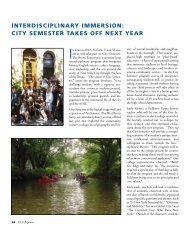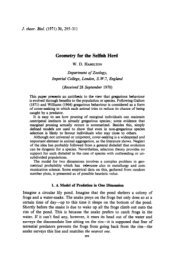Chapter 6 - Ethical Culture Fieldston School
Chapter 6 - Ethical Culture Fieldston School
Chapter 6 - Ethical Culture Fieldston School
You also want an ePaper? Increase the reach of your titles
YUMPU automatically turns print PDFs into web optimized ePapers that Google loves.
“Mr. Sinatra Gets Rejected”<br />
Confronted with such possibilities or realities, some will strike the tent of<br />
aspiration, wisely striking a bargain for what seems attainable. Others will hold<br />
out at least a while longer, insecure with the new knowledge that stakes are now<br />
higher than ever. Some will learn from their experiences, and others will descend<br />
into mindless self‐destruction – like wielding a sledgehammer against concrete.<br />
The really amazing thing, though, is the way any person seems to remain capable<br />
of both in lives that, to invoke Sinatra’s contemporary Yogi Berra, are never quite<br />
over until they’re over.<br />
When Sinatra entered Columbia Recording Studios on March 27, 1951, his<br />
career had just about bottomed out. The label hadn’t dropped him yet, but the<br />
writing was on the wall. This was the period in his life when he was producing<br />
his most embarrassing work – a time when, in collaboration with Columbia<br />
executive Mitch Miller, he recorded novelty songs like “The Huckle Buck” and<br />
“Mamma Will Bark” that generated ridicule perhaps most vociferously from<br />
Sinatra himself.<br />
And yet – as those who have examined Sinatra’s work closely have long<br />
noted – mid‐century was also a major artistic turning point in his career. In 1951,<br />
for example, Sinatra recorded “The Birth of the Blues,” a remarkable musical<br />
snapshot that captured the fluidity of his youthful voice as well as the more<br />
assertive style that would characterize his Capitol work and more than<br />
compensate for any loss of vocal purity in the next decade. Confident yet<br />
melancholy, clearly patterned on the blues and yet bearing the stamp of his own<br />
inimitable style, “The Birth of the Blues” almost single‐handedly illustrates the<br />
difference between Sinatra’s commercial decline and artistic decline. Here, quite<br />
simply, is a hitless pop singer near the height of his powers.<br />
37 Davis quoted in Nancy Sinatra, My Father, p. 91.<br />
American History for Cynical Beginners<br />
31
















